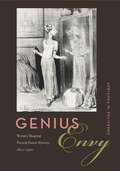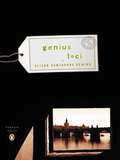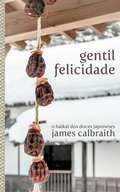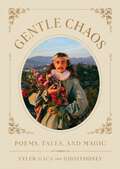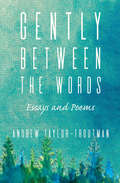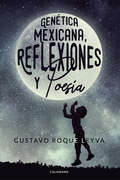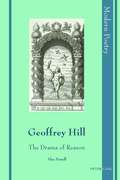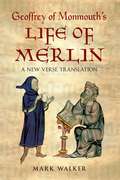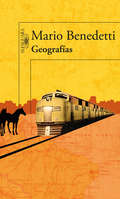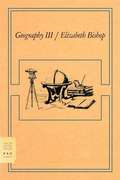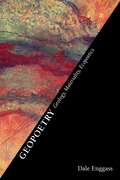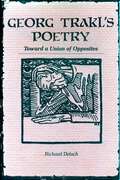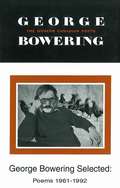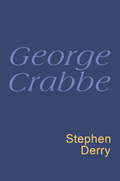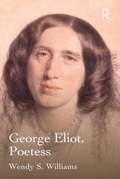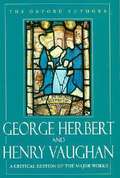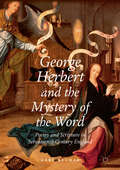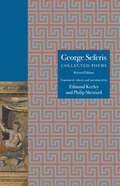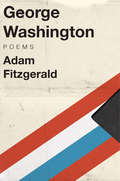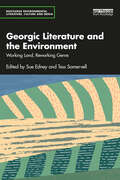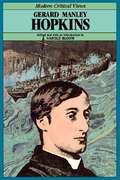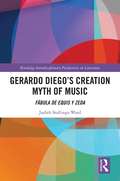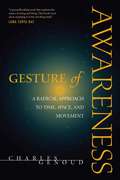- Table View
- List View
Genius Envy: Women Shaping French Poetic History, 1801–1900
by Adrianna M. PaliyenkoIn Genius Envy, Adrianna M. Paliyenko uncovers a forgotten history: the multiplicity and diversity of nineteenth-century French women’s poetic voices. Conservative critics of the time attributed the phenomenon of genius to masculinity and dismissed the work of female authors as "feminine literature." Despite the efforts of leading thinkers, critics, and literary historians to erase women from the pages of literary history, Paliyenko shows how these female poets invigorated the debate about the origins of genius and garnered considerable recognition in their time for their creativity and bold aesthetic ideas.This fresh account of French women poets’ contributions to literature probes the history of their critical reception. The result is an encounter with the texts of celebrated writers such as Marceline Desbordes-Valmore, Anaïs Ségalas, Malvina Blanchecotte, Louisa Siefert, and Louise Ackermann. Glimpses at the different stages of each poet’s career show that these women explicitly challenged the notion of genius as gender specific, thus advocating for their rightful place in the canon.A prodigious contribution to studies of nineteenth-century French poetry, Paliyenko’s book reexamines the reception of poetry by women within and beyond its original context. This balanced and comprehensive treatment of their work uncovers the multiple ways in which women poets sought to define their place in history.
Genius Loci
by Deming Alison HawthorneFrom a poet and essayist whose writing about nature has won her comparisons with Gary Snyder and Terry Tempest Williams comes a new collection that offers further evidence of her ability to trace the intersections of the human and nonhuman worlds. The title poem is a lyrical excavation of the city of Prague, where layers of history, culture and nature have accumulated to form "a genius loci"-a guardian spirit. From "Genius Loci" Return to a place where nothing in particular can be seento explain why you return, nothing you can name, though you can touch the memory of the landscape-linden trees in a hedgerow, cut wheatfield, ruins of the longhouse, rolling meadow of sunflowers blooming, the musk of their oil, contained heat.
Gentil Felicidade
by Flávio Ferreira Marinho James CalbraithQuer como um ingrediente crucial da cerimônia do chá, um elemento importante dos rituais do santuário, ou simplesmente como um meio para refrescar-se durante o verão japonês escaldante, doces são tão centrais para a vida e cultura japonesa como a poesia ou a jardinagem. Para mim, eles também têm sido uma maneira de experimentar esta cultura - e algumas das minhas melhores recordações do Japão são de uma forma ou de outra relacionadas com sua diversidade. Uma noite de verão, do nada, comecei a escrever haicais sobre essas memórias. Acabei com setenta pequenos poemas - o suficiente para colocar todos juntos neste livreto. Poesias e doces O que mais um sábio necessita Nessa noite de verão
Gentle Chaos: Poems, Tales, and Magic
by Tyler GacaFrom the wild imagination of Tyler Gaca, also known as TikTok's Ghosthoney, comes a beautiful compendium of poems, images, personal stories, and vignettes that explore magic, queerness, Tyler&’s unique story, and the enchantment and comfort to be found in the weird, the dark, and the different. In this raw yet enchanting collection of poems, essays, photographs, and artworks, Tyler Gaca dreamily navigates themes of magic and queerness, offering readers an intimate look inside his mind and his worlds, real and imagined. The writings in Gentle Chaos reflect on growing up queer and in love with magic, discovering yourself and your place in the world, and daring to seek out love and hope. The artworks are dedicated to salvaged antique photographs, haircuts, dead moths, the creatures we dream up, and much more. The result is a whimsical, vulnerable, and transporting journey into the gentle chaos within us all.
Gently Between the Words: Essays and Poems
by Andrew Taylor-TroutmanGently Between the Words guides and instructs our heartsIn his latest collection of essays and poems Taylor-Troutman guides readers through seemingly simple stories of death, life, parenting struggles, successes and failures that speak to larger questions we all face: How do we best spend our time? How can we raise our kids to be kind and confident? Who gives us guidance and wisdom? What does love look like in our lives on a day-to-day basis?In simple and important gestures like cleaning spilled milk with toilet paper, flipping the perfect pancake with your partner, and walking down the beach with your young child, readers find universal truths to guide their own lives regardless of personal circumstances.Gently Between the Words guides and instructs our hearts to keep the endangered language of beauty, love, forgiveness, grace, and sensitivity alive in order that we all might become more and more necessary to the urgency of our times and the dreams of our children. —Jaki Shelton Green, NC Poet Laureate
Genética Mexicana, Reflexiones y Poesía
by Gustavo Roque LeyvaCierro los ojos y busco tu mirada por el camino de la esperanza. La riqueza de México está en su gente. ¿Quién te reconducirá? Una mirada interior con procesos mentales nuevos escribirá el pensamiento azteca con el vergel reconstruido, donde reaparezca el canto del Cenzontle. La inspiración reedificará letras de amor, interpretadas en las alas del alba. Con la ternura que enseña la montaña y la reflexión universal, la imaginación renacerá; colgados de la luna, con el canto de la alondra, el mirlo o cualquier ave excepcional, hasta poemas de amor se escribirán para conquistar el territorio espiritual más preciado: tu corazón.
Geoffrey Hill: The Drama Of Reason (Modern Poetry Series #9)
by Alex PestellGeoffrey Hill (1932-2016) was often hailed as one of the most important - and one of the most difficult - poets of his lifetime. This book is a timely investigation into a writer whose work seems simultaneously to invite analysis and to refuse explanations of its sensuous, allusive language. <P><P> It provides an introduction to Hill's work for readers coming to it for the first time and offers an account of his poetics that will be of interest to his more experienced readers. Alongside many close readings of poems spanning Hill's long and varied career, the author brings to light findings from the Geoffrey Hill Archive in Leeds and investigates the poet's important critical writings. <P><P>Hill's often antagonistic engagement with the thought of other poets and philosophers supplies the book's structure. Coleridge, Eliot, F. H. Bradley and Ezra Pound are engaged by Hill in a dramatic contest over what the author claims is his visionary aim for poetry: the realisation of the objective conditions of judgement. <P><P>Above all, Hill is presented as a quintessentially modernist poet - at odds with modernity, and at the same time creating a language answerable to its rich, traumatic complexity.
Geoffrey of Monmouth's Life of Merlin
by Mark Walker Dilip Sarkar Geoffrey MonmouthFor the first time in English, Mark Walker presents a verse translation of the twelfth-century epic poem by Geoffrey of Monmouth, the originator of many of the Arthurian legends familiar to us today. Here is the original Merlin - a mysterious and mad character inspired by ancient Welsh legends. But he is also a king, a prophet, and a modern Renaissance man. This brand-new translation casts Geoffrey's Latin into accessible English hexameter verse, giving readers a feel for the rhythms of the original. The extensive introduction sets the poem in the context of Geoffrey's life and writings, while each chapter opens with helpful background material. Turn back the pages of time and discover the mythical, magical world of the original Merlin.
Geografías
by Mario BenedettiPocas veces se ha conseguido como en este libro recrear con tanta ternura, con tanto sentido del humor y tanta penetración un universo cotidiano a menudo traspasado por las lanzadas del sufrimiento. Las búsquedas poéticas y los recursos narrativos aparecen con frecuencia entrelazados en las obras de Mario Benedetti. En Geografías, libro íntegramente redactado durante su exilio español, el autor reúne catorce cuentos y otros tantos poemas, agrupados en dúos afines, colocando cada uno de esos pares bajo el resguardo de un membrete geográfico.
Geography III
by Elizabeth BishopWhether writing about waiting as a child in a dentist's office, viewing a city from a plane high above, or losing items ranging from door keys to one's lover in the masterfully restrained "One Art," Elizabeth Bishop somehow conveyed both large and small emotional truths in language of stunning exactitude and even more astonishing resonance. As John Ashbery has written,"The private self . . . melts imperceptibly into the large utterance, the grandeur of poetry, which, because it remains rooted in everyday particulars, never sounds 'grand,' but is as quietly convincing as everyday speech. "
Geopoetry: Geology, Materiality, Ecopoetics (Recencies Series: Research and Recovery in Twentieth-Century American Poetics)
by Dale EnggassAt its core, geopoetics proposes that a connection between language and geology has become a significant development in post–World War II poetics. In Geopoetry, Dale Enggass argues that certain literary works enact geologic processes, such as erosion and deposition, and thereby suggest that language itself is a geologic––and not a solely human-based––process. Elements of language extend past human control and open onto an inhuman dimension, which raises the question of how literary works approach the representation of nonhuman realms. Enggass examines the work of Clark Coolidge, Robert Smithson, Ed Dorn, Maggie O&’Sullivan, Jeremy Prynne, Jen Bervin, Christian Bök, and Steve McCaffery, and he finds that while many of these authors are not traditionally connected to ecocritical writing, their innovations are central to ecocritical concerns. In treating language as a geological material, these authors interrogate the boundary between human and nonhuman realms and offer a model for a complex literary engagement with the Anthropocene.
Georg Trakl's Poetry: Toward a Union of Opposites
by Richard DetschThe chaotic mixture of elements in Trakl's poems is more apparent than real, this book argues, thus challenging the "Orphic" view of Walther Killy and his followers. A dream of unity—one of the most ancient dreams in human history—is in fact reflected in all of Trakl's work.The recurring themes in Trakl's poetry are brought into focus through Dr. Detsch's literary, psychological, and philosophical analysis: the union of male and female in incest from the Jungian standpoint, the union of life and death from the Heideggerian standpoint and that of German Romanticism as represented by Novalis, the union of good and evil from the Dostoyevskian or Nietzschean standpoint, the mixture of images from the Goethean definition of symbolism.Trakl (1887–1914) is presented as a poet whose lyric voice sounded a cry of hope in its deepest despair. As Dr. Detsch's generous quotations from the poet's work (in the original German) make clear, Georg Trakl sought poetic expression for a union of opposites.
George Bowering: Selected Poems 1961-92
by George BoweringGeorge Bowering's poetic output has slowed since the early 1980s, when he began to devote his prolific and versatile imagination almost exclusively to prose fiction. Nevertheless, the 31 years encompassed by George Bowering Selected saw the publication of 28 volumes of verse--a substantial output by anyone's standards. Gleaning a single coherent selection from this immense oeuvre would seem to be an impossible task, but George Bowering Selected comes very close to providing an ideal survey. Bowering's poetics is one of speed and constant postmodern play--with words, with ideas, and with perceptions. His poetry's emphasis on the rapidity of thought and of the process of reading means that his books are not easily trimmed into anthology pieces. Instead of spending months with a few choice lyrics, the reader who wishes to come to terms with Bowering must methodically work through the poems at length, and George Bowering Selected is structured to facilitate this style of reading. There are plenty of short, Creeley-like lyrics here, representing the early and late periods of Bowering's career, but the core of the book is the three long serial poems that are presented in full: At War with the U.S., Allophanes, and his masterpiece, The Kerrisdale Elegies. The last may be his most "poetic" poem, but its motion and concerns are quintessential Bowering. George Bowering Selected is quite simply the best available introduction to the work of this difficult and inventive poet. Don't dabble; read it from cover to cover. --Jack Illingworth
George Crabbe: Everyman Poetry
by Stephen DerryA selection of poems by George Crabbe, edited by Stephen Derry
George Crabbe: Everyman's Poetry
by Stephen DerryA selection of poems by George Crabbe, edited by Stephen Derry
George Eliot, Poetess
by Wendy S. WilliamsThe position of George Eliot’s poetry within Victorian poetry and within her own canon is crucial for an accurate picture of the writer, as Wendy S. Williams shows in her in-depth examination of Eliot’s poetry and her role as poetess. Williams argues that even more clearly than her fiction, Eliot’s poetry reveals the development of her belief in sympathy as a replacement for orthodox religious views. With knowledge of the Bible and a firm understanding of society’s expectations for female authorship, Eliot consciously participated in a tradition of women poets who relied on feminine piety and poetry to help refine society through compassion and fellow-feeling. Williams examines Eliot’s poetry in relationship to her gender and sexual politics and her shifting religious beliefs, showing that Eliot’s views on gender and religion informed her adoption of the poetess persona. By taking into account Eliot’s poetess treatment of community and motherhood, Williams suggests, readers come to view her not only as a writer of fiction, an intellectual, and a social commentator, but also as a woman who longed to nurture, participate in, and foster human relationships.
George Herbert and Henry Vaughan (The Oxford Authors)
by George Herbert Louis Martz Henry VaughanThis volume presents the work of two poets linked by the tribute of creative imitation gratefully paid by Vaughan to Herbert. Read side by side, as this one-volume collection makes possible, the artists' verse fully reveals their individual powers, even as the complex nature of Vaughan's use of Herbert's imaginative example is thrown into greater relief. The book contains the complete English poetry of Herbert, his prose treatise, The Country Parson, the complete text of Vaughan's Silex Scintillans, including all material in both the 1650 and 1655 editions, and a selection from Vaughan's early secular poetry. Louis Martz's introduction and commentary help bring the religious controversies of the age into focus. The text also features chronologies of the lives of the two men and suggestions for further reading.
George Herbert and the Mystery of the Word
by Gary KucharThis book presents a historically and critically nuanced study of George Herbert's biblical poetics. Situating Herbert's work in the context of shifting ideas of biblical mystery, Gary Kuchar shows how Herbert negotiated two competing impulses within post-reformation thought--two contrary aspects of reformation spirituality as he inherited it: the impulse to certainty, assurance, and security and the impulse to mystery, wonder, and wise ignorance. Through subtle and richly contextualized readings, Kuchar places Herbert within a trans-historical tradition of biblical interpretation while also locating him firmly within the context of the early Stuart church. The result is a wide ranging book that is sure to be of interest to students and scholars across several different fields, including seventeenth-century studies, poetry and the bible, and literature and theology.
George Seferis: Collected Poems, Revised Edition (Princeton Modern Greek Studies)
by George SeferisIn this new edition of George Seferis's poems, the acclaimed translations by Edmund Keeley and Philip Sherrard are revised and presented in a compact, English-only volume. The revision covers all the poems published in Princeton's earlier bilingual edition, George Seferis: Collected Poems (expanded edition, 1981). Winner of the Nobel Prize for Literature in 1963, George Seferis (1900-1971) has long been recognized as a major international figure, and Keeley and Sherrard are his ideal translators. They create, in the words of Archibald MacLeish, a "translation worthy of Seferis, which is to praise it as highly as it could be praised."Although Seferis was preoccupied with his tradition as few other poets of the same generation were with theirs, and although he was actively engaged in the immediate political aspirations of his nation, his value for readers lies in what he made of this preoccupation and this engagement in fashioning a broad poetic vision. He is also known for his stylistic purity, which allows no embellishment beyond that necessary for precise yet rich poetic statement.
George Washington: Poems
by Adam FitzgeraldA groundbreaking collection from one of our most acclaimed young poets about personal loss and consumer anxiety in the American suburbs. In the wake of the critical success of The Late Parade (“poetry as lush as any of Keats’s odes,” New York Times Book Review), Adam Fitzgerald’s George Washington follows in the documentary poetics tradition of William Carlos Williams’s In the American Grain and Susan Howe’s My Emily Dickinson. These frenetic poems channel the proper names and product placement in the suburban New Jersey memescape of the 1990s. Fitzgerald’s catalogs—a world of video games and love songs, entertainment franchises and widespread anomie—seek out the proxies by which millions now live their most intimate experiences, examining everything from sexuality and faith to the spectacles of shopping and mass shootings. The poet’s memory may prove as fungible as the once-ubiquitous VHS cassette, but these queer poems form a hypertext archive of life as it’s packaged and purveyed. Fitzgerald’s “primal vision” (Harold Bloom), so wildly alive in The Late Parade, metamorphoses into an exhilarating exploration of Americana’s dark origins.
Georgic Literature and the Environment: Working Land, Reworking Genre (Routledge Environmental Literature, Culture and Media)
by Sue Edney Tess SomervellThis expansive edited collection explores in depth the georgic genre and its connections to the natural world. Together, its chapters demonstrate that georgic—a genre based primarily on two classical poems about farming, Virgil’s Georgics and Hesiod’s Works and Days—has been reworked by writers throughout modern and early modern English-language literary history as a way of thinking about humans’ relationships with the environment. The book is divided into three sections: Defining Georgic, Managing Nature and Eco-Georgic for the Anthropocene. It centres the georgic genre in the ecocritical conversation, giving it equal prominence with pastoral, elegy and lyric as an example of ‘nature writing’ that can speak to urgent environmental questions throughout literary history and up to the present day. It provides an overview of the myriad ways georgic has been reworked in order to address human relationships with the environment, through focused case studies on individual texts and authors, including James Grainger, William Wordsworth, Henry David Thoreau, George Eliot, Thomas Hardy, Seamus Heaney, Judith Wright and Rachel Blau DuPlessis. This is a much-needed volume for literary critics, academics and students engaged in ecocritical studies, environmental humanities and literature, addressing a significantly overlooked environmental literary genre.
Gerard Manley Hopkins (Modern Critical Views)
by Harold BloomThe poetry is viewed in reference to his culture and surroundings, as well as within the context of his own life experience.
Gerardo Diego’s Creation Myth of Music: Fábula de Equis y Zeda (Routledge Interdisciplinary Perspectives on Literature)
by Judith Stallings-WardSince its publication nearly eight decades ago, the consensus among scholars about Fábula de Equis y Zeda, by the Spanish poet Gerardo Diego (1896-1987) remains unchanged: Fábula is an enigmatic avant-garde curiosity. It seems to rob the reader of the reason necessary to interpret it, even as it lures him or her ineluctably to the task; nevertheless, the present study makes the case that this work is, in fact, not inaccessible, and that what the anhelante arquitecto, intended with his masterpiece was a creation myth that explains the evolution of music in his day. This monograph unlocks the fullness of the poem´s meaning sourced in music’s mythical consciousness and expressed in a poetic idiom that replicates aesthetic concepts and cubist strategies of form embraced by the neoclassical composers Bartok, Falla, Ravel, and Stravinsky.
Gesture of Awareness: A Radical Approach to Time, Space, and Movement
by Charles GenoudFrom a major mind of Buddhism today comes this unique philosophical work, which hearkens back to the classical verse-form, but in a modern voice that speaks directly to the twenty-first century reader and practitioner. Gesture of Awareness involves a fascinating philosophical exploration of time, space, and movement but at the same time is a manual for an embodied "practice of exploration." Genoud is very well known to the leading lights of Buddhism today. He and his work are continuingly praised for their invention and importance. Well-versed in French and continental philosophies, as well as Eastern thought, he has produced a work that will be welcomed as a Buddhist book and a noteworthy contribution to the larger philosophical community.
